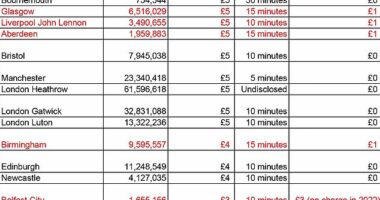
The Dividend Hero investment trusts that bucked the trend and increased payouts as investors were hit by a wave of cuts last year have been revealed.
The 19-strong Dividend Hero list features trusts that lifted their payments to investors, despite a 41 per cent collapse in UK dividends as companies slashed costs to fight the coronavirus crisis.
The latest data on the trusts with the longest-running records of raising dividends year-in, year-out has been released by the Association of Investment Companies – and a trio continued an impressive history that dates back 54 years.
City of London, Bankers and Alliance Trust have raised dividend payments every year since 1967, when the Beatles reached number one in the charts with All You Need is Love and Dustin Hoffman and Anne Bancroft starred in The Graduate.


Three of the Dividend Hero investment trusts have a record of raising payouts to investors every year since Dustin Hoffman and Anne Bancroft starred in The Graduate
The three lead a pack of six dividend heroes that have bumped up payments to investors for at least 50 years, with Caledonia Investments, BMO Global Smaller Companies and F&C Investment Trust joining them above that half-century benchmark.
The AIC said that five more of the trusts on the list have increased dividends for at least 40 years in a row and four have beaten the 30-year mark.
Investment trusts’ structure means they are able to hold back some dividend income in the good years to stash away in reserves and support payouts in the bad years, hence some having such strong long-term records.
Yields from the investment trusts on the Dividend Hero list vary substantially, as do investing strategies.


All You Need is Love… and a nice steady dividend: City of London, Bankers and Alliance Trust have been raising payouts since the Beatles’ heyday.
For example, leader of the pack City of London is a UK-focussed equity income trust with a bumper 5.1 per cent yield, while global growth giant Scottish Mortgage also features with a 38-year history of lifting payouts, but it yields just 0.3 per cent.
Both City of London and Scottish Mortgage are long-standing investor favourites, but their performance over the past 12 months highlights the divergence in returns in the coronavirus pandemic year: Scottish Mortgage’s share price is up 124.7 per cent, whereas City of London’s has risen 25.3 per cent.
While this gap highlights how different investing strategies have fared, investors should be wary of reading too much into 12-month figures overall at the moment as they are drawing a comparison with low points in the Covid-19 crash last March.
| Investment company | AIC sector | Years of dividend increases | Yield (%) | Share price total return 1 year |
Share price total return 5 years |
Share price total return 10 years |
Share price total return 20 years | Share price total return 40 years |
|---|---|---|---|---|---|---|---|---|
| City of London | UK Equity Income | 54 | 5.1 | 25.3 | 29.9 | 103.4 | 269.5 | 9,383.40 |
| Bankers | Global | 54 | 2 | 38.3 | 116.6 | 243.9 | 508 | 17,934.00 |
| Alliance Trust | Global | 54 | 1.6 | 48.2 | 106.8 | 228.7 | 358.2 | 10,559.40 |
| Caledonia Investments | Flexible Investment | 52 | 2.3 | 1.5 | 34.5 | 98.5 | 422.5 | 17,313.60 |
| BMO Global Smaller Companies | Global Smaller Companies | 50 | 1.1 | 43.6 | 63.1 | 196.1 | 691.9 | 12,691.60 |
| F&C Investment Trust | Global | 50 | 1.5 | 39.7 | 102.6 | 218.2 | 381.8 | 10,744.30 |
| Brunner | Global | 49 | 2.3 | 32.1 | 91.9 | 184.8 | 239.1 | 6,873.90 |
| JPMorgan Claverhouse | UK Equity Income | 48 | 4.4 | 21.3 | 50.4 | 114.8 | 184 | 7,883.40 |
| Murray Income | UK Equity Income | 47 | 4.1 | 26.1 | 61.2 | 114.4 | 280.7 | 9,377.50 |
| Scottish American | Global Equity Income | 47 | 2.6 | 38.8 | 109 | 182.5 | 324.2 | 4,920.80 |
| Witan | Global | 46 | 2.4 | 40.7 | 73.8 | 187.5 | 308.5 | 8,633.50 |
| Merchants | UK Equity Income | 38 | 5.7 | 38.8 | 54.8 | 112.4 | 253.7 | 6,927.50 |
| Scottish Mortgage | Global | 38 | 0.3 | 124.7 | 388.5 | 820.2 | 1,908.60 | 40,775.90 |
| Scottish Investment Trust | Global | 37 | 3.2 | 18.3 | 43.5 | 93.3 | 180.2 | 4,419.90 |
| Value and Indexed Property Income2 | UK Equity Income | 33 | 5.7 | 16.1 | 21.2 | 78.8 | 224.9 | N/A |
| BMO Capital & Income | UK Equity Income | 27 | 3.8 | 23.1 | 45.5 | 102.7 | 281.9 | N/A |
| Schroder Income Growth | UK Equity Income | 25 | 4.3 | 41.1 | 51.5 | 136 | 370.2 | N/A |
| Invesco Income Growth | UK Equity Income | 23 | 4.3 | 23.5 | 25.3 | 114 | 250.8 | N/A |
| Aberdeen Standard Equity Income | UK Equity Income | 20 | 6.2 | 23.4 | 0.7 | 77.6 | 188.1 | N/A |
| Source: AIC 15 March 2021 figures to 12/3/2021 | ||||||||
Annabel Brodie-Smith, of the Association of Investment Companies, said: ‘Against the challenging backdrop of 2020 it’s encouraging to see that investment companies’ structural benefits came to the fore and delivered for investors.
‘Investment companies’ ability to save up to 15 per cent of their income each year to boost payouts in difficult years is a huge income advantage. It has helped the dividend heroes achieve their remarkable track records of consistent dividend growth, with four stretching as far back as the 1960s.
‘But this impressive income resilience isn’t just limited to the dividend heroes. Investment companies’ structural benefits helped 85 per cent of equity income-paying investment companies increase or maintain their dividends in 2020 during the pandemic, compared to 23 per cent of their open-ended counterparts.
‘Despite investment companies’ impressive record, it’s important investors remember that dividends are never guaranteed.’








